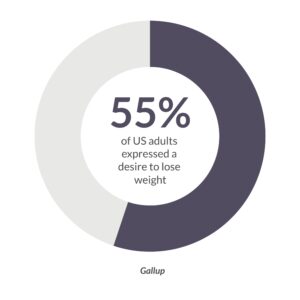By Mandy Parsons
A recent Gallup poll found that 55% of US adults expressed a desire to lose weight, and 26% are actively trying to slim down.
With more than half of Americans focused on losing weight, it makes sense that weight loss continues to be a hot topic. Our feeds are inundated with the latest weight loss trends from keto to intermittent fasting to supplements.
 Consequently, the newest weight loss buzz belongs to a class of drugs called glucagon-like peptide-1 receptor agonists (GLP-1 RAs). These drugs, which include Ozempic and Wegovy as well as Mounjaro, are used in the treatment of type 2 diabetes and obesity.
Consequently, the newest weight loss buzz belongs to a class of drugs called glucagon-like peptide-1 receptor agonists (GLP-1 RAs). These drugs, which include Ozempic and Wegovy as well as Mounjaro, are used in the treatment of type 2 diabetes and obesity.
To date, only Wegovy is approved by the Food and Drug Administration for weight loss, yet celebrities and stay-at-home moms alike are turning to medications like Ozempic for off-label weight management.
And while off-label use of Ozempic isn’t prohibited, it doesn’t come without risk. There are potential dangers of using Ozempic for weight loss, and it’s important to understand the complexities of rapid weight loss solutions. Many already-thin individuals are using these drugs to shed a few pounds, but it’s an extreme method for going down a size or two. Also, for those already at risk of eating disorders, it can contribute to or worsen those issues.
How Does Ozempic Work?
Ozempic contains the active ingredient semaglutide. As UCLA Health explains, semaglutide mimics the GLP-1 hormone released in the gut in response to eating.
One function of GLP-1 is to stimulate insulin production in the body, which lowers blood sugar. For this reason, medical professionals often prescribe semaglutide for type 2 diabetes.
However, in higher amounts, GLP-1 may also suppress your appetite, slow food digestion and gastric emptying, or increase feelings of fullness after a meal. When prescribed alongside diet and exercise, it can result in substantial weight loss. Meadows Senior Fellow Dr. Kevin McCauley confirms this from personal experience.
“I’ve always wanted to be a person who did not have any emotional connection to food, that I just ate food and enjoyed food like normal people, where I didn’t feel that push to go eat another thousand calories at the end of the day,” says McCauley. Since starting the medication and combining it with diet and exercise, he says he has lost 30 pounds.
Research from the JAMA Network revealed that patients on weekly semaglutide treatments for 20 weeks experienced a mean weight loss of 10.6%. A recent study from The New England Journal of Medicine also showed Ozempic to offer both diabetics and non-diabetics the same cardiovascular benefits by improving glucose levels, reducing blood pressure and cholesterol levels, and reducing inflammation.
Nevertheless, the same mechanisms that make semaglutide effective for weight loss also trigger unwanted side effects. The most common include nausea, vomiting, and diarrhea. But according to some health experts, there is even greater cause for concern.
Dangers of Ozempic
There is no question that Ozempic works, and patients are experiencing significant weight loss. What isn’t clear, however, is how these drugs will affect users long-term.
There is no question that Ozempic works, and patients are experiencing significant weight loss. What isn’t clear, however, is how these drugs will affect users long-term. Is it dangerous to take Ozempic for weight loss? For those with a high body mass index score where there is significant risk of stroke or other heart issues, the risk may be worth it, but they aren’t the only ones using these medications.
Randy Seeley, an obesity researcher at the University of Michigan, explains to The New York Times that Ozempic and Wegovy are not correcting a lack of GLP-1. People with obesity produce enough of the hormone already.
Rather, these medications are exposing the brain to hormone levels not seen in nature.
Furthermore, he warns that “the drugs go to unusual places” in the brain, not just those that control eating.
And there are those immediate symptoms to consider. Abdominal pain, constipation, and appetite loss may seem a small price to pay, but many of these adverse reactions do not improve over time, causing additional problems such as stress, anxiety, or depression.
Moreover, in severe cases, Ozempic can bring about thyroid tumors, pancreatitis, hypoglycemia, malnutrition, changes in vision, kidney failure, gallbladder issues, gastroparesis, and even cancer. These conditions are quite serious and often require hospitalization.
Lastly, the dangers of Ozempic are particularly risky for those who struggle with an eating disorder. Healthline.com warns that the recent hype around Ozempic and other weight loss drugs can cause someone struggling with or in recovery from an eating disorder to think about weight, which can be unintentionally harmful.
Is Ozempic for You?
Ultimately, only you can decide whether the benefits outweigh the dangers of using Ozempic for weight loss. It’s important to keep in mind that Ozempic was developed to treat type 2 diabetes, and there are dangers of taking Ozempic if not diabetic.
It shouldn’t be used as a “quick fix” to shed a few pounds, especially if you are prone to disordered eating or other harmful weight loss behaviors.
Even when prescribed for weight loss, it is indicated for patients with a BMI of 30 and up or those suffering from chronic obesity who have tried everything else to lose weight. It shouldn’t be used as a “quick fix” to shed a few pounds, especially if you are prone to disordered eating or other harmful weight loss behaviors.
Also, research shows that within a year of stopping semaglutide, users regained two-thirds of their prior weight loss. “Unfortunately, if you stop taking the drug, the effect wears off,” says McCauley. “So this really is a kind of lifetime commitment and a lifetime-lifestyle change. But the medication shows a lot of promise.”
Worth noting are also contraindications with usage if you have a family history of thyroid cancer, problems with your pancreas or kidneys, diabetic retinopathy, or are planning to become pregnant. Certain medications or supplements negatively interact with the drug as well.
Body Image Help Is Available
You should always proceed with caution when trying any new medication and remember to prioritize your overall health and well-being. If you are a woman who struggles with eating issues of any kind, The Meadows Ranch can help.
Our program seeks to help you heal from your eating disorder by uncovering the complex psychological factors contributing to your unhealthy relationship with food. To better understand what we treat and why we are the perfect place to begin your healing journey, reach out today.

